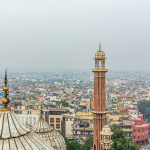After the UK, South African and Brazilian variants, searchers are now thoroughly monitoring the situation in India. In this country – counting over 1.3 billion people – Covid-19 cases skyrocket. And some people think because it is caused by the spread of the B.1.617 variant – the scientific name given to this Indian variant – discovered for the first time this Fall 2020 in the Nagpur region.



 Covid: what is known about the Indian variant, the “double mutant” worrying scientists
Covid: what is known about the Indian variant, the “double mutant” worrying scientists
As many scientists are thoroughly monitoring the Brazilian variant, others have their eyes set on the Indian variant. Nicknamed “double mutant”, this strain is suspected of being behind a new surge of the Covid-19 epidemic in India. Should this Indian variant be feared? What is known exactly about it? Keep reading to find out more. [Read more]
Even though the country’s authorities express reservations as for an eventual relationship between the surge of this Indian variant and the surge of the Covid-19 epidemic in India, Santé Publique France notices the outbreak of this “double mutant” coincides with “a very negative epidemic situation”, people should remain cautious. Therefore, “it seems likely this deterioration of the health situation is mostly caused by the many big gatherings that recently took place everywhere in the country and the low compliance with preventive measures by the overall population”.
So, is the Indian variant already in Europe? Is it circulating in France? At this stage, no Covid-19 case related to this “double mutant” has been detected in France so far. Yet, this Indian variant has been “sporadically detected in Canada and Singapore”. And Europe is not escaping from it either as this strain has also been found in the United Kingdom, as well as Ireland, Germany, Italy, Spain, and Belgium, LCI reports adding this “double mutant” represents to date less than 1% of the cases reported in these countries – according to statistics.
As for Belgium, our peers from Francetvinfo report the Belgian government commissioner entrusted with the health crisis announced this Thursday April 22 that 20 cases have been detected in the Flemish cities of Alost and Louvain within a group of students coming from India and who routed through the Roissy airport. Arrived in mid-April, the latter have been immediately placed in quarantine. According to experts, these students have been infected by a "super-contaminator" - probably within the very group.
Yet, some countries are extremely cautious. For instance, the United Kingdom has decided to ban access to the country to all travelers from India. Excluding British citizens who yet have to comply with quarantine once back in their country.
This April 21, government spokesman Gabriel Attal announced India was now part of the countries travelers from which must go in compulsory quarantine, namely Brazil, Chile, Argentina, and South Africa.